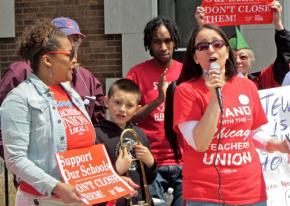You can’t just take our school
Residents of Chicago's Uptown neighborhood are organizing to demand quality schools and affordable housing, reports .
"WE ARE your future! We are your future!" chanted dozens of African American and Latino children outside of Stewart Elementary, their school on Chicago's far North Side, on April 27. Stewart is near a major intersection that stares directly at a multilevel Target store that has been open since July 2010--and a newly remodeled BMO Harris bank. Hundreds of cars drove by, many honking their horns in support.
Brand new "market-rate" housing developments are popping up all over the Uptown neighborhood. The idyllic-looking elementary school, with a brand new playground, will most likely be turned into market-rate condos, too, if James Cappleman, the alderman for the Uptown ward, and Chicago Mayor Rahm Emanuel have their way. Stewart is one of more than 50 elementary schools in Chicago that is considered "underutilized" and scheduled to be closed following the 2012-13 school year.
Parents, students and community members spoke on the playground of Stewart Elementary at a rally of more than 100 people who came together to take a stand against the closing of schools and the lack of affordable housing in their neighborhood. Cappleman was nowhere to be seen, despite having an office across the street from the school.

Pam Barton has been on the local school council at Stockton Elementary--another school on the chopping block in the Uptown neighborhood--for 14 years. She, her children and her grandchildren all went to Stockton. When it was her turn to address the crowd, she said:
Do you know how many hours I have spent building Stockton, trying to make it the best possible place for my children's and grandchildren's education? Do you know how many school council meetings I have attended? Fourteen years' worth! Do you know how it feels to have someone decide to close the school you raised your kids and grandkids in, without so much as one meaningful discussion during which I felt my thoughts, concerns and time investment over the years were considered?
I'll tell you what. I'm not moving! I'm not letting them close our schools! The politicians in this city, the people who run CPS, are filled with deceit...and I'm not standing for it. I'm not letting the rich people of this city take away all I have worked for!
The crowd erupted in applause.
"You don't see these attacks on the wealthy schools where the mayor sends his kids," said another parent who stood to speak. "Schools where music, art and science aren't considered an underutilization of time, but rather something to be valued. Why are all these school closings happening in poor communities of color? Is it a coincidence or is it racism?"
Following the rally, the students, parents and activists marched along a mile-long route to tour the low-income housing and health service facilities that have been or are scheduled to be torn down to make way for "market-rate" housing and restaurants.
Thousands of working-class and low-income people are being run out of the Uptown neighborhood. "Where are the poor and working class supposed to go?" Mark Kaplan, a speaker on the tour, said. The last stop on the march was Stockton, where everyone on the march linked arms and chanted "Hands off Stockton!" Parents, teachers, students and activists know that solidarity between schools is the only way to win.
April 27 was the first nice day of the year in Chicago. It was 70 degrees and sunny. The kids from Stockton and Stewart could have been out playing with their friends. They could have been reading, playing sports or practicing an instrument. The parents and teachers in attendance at the rally could have been relaxing after a long week of work.
But they weren't. In the richest country in the world, they were standing outside on a street corner entrenched in a battle to protect the basic human right to education and housing. Our future should--and can be--so much more than this.


